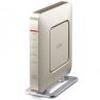Yep no, joke beamforming technology. The WSR-2533DHP is utilizing the beamforming technology for improving your WiFi reception and reducing interference (the router determines where your device is located and projects a stronger signal in that specific direction).
This new 802.11ac home router is built with 1x Internet LAN port, 4x LAN ports and a WPS button, and supports for dual-band WiFi access point (2.4GHz – 800Mbps and 5GHz – 1733Mbps).
Furthermore, the WSR-2533DHP provides security through encryption using WPA2-PSK (AES), WPA/WPA2 mixed PSK (TKIP/AES mixed) and WEP (128/64bit). The Buffalo WSR-2533DHP will begin shipping from the end of October for 16,500 Yen (about $160) in Champagne Gold and Cool Black color options.
Buffalo WSR-2533DHP Dual-Band WiFi Router has Beamforming Technology


